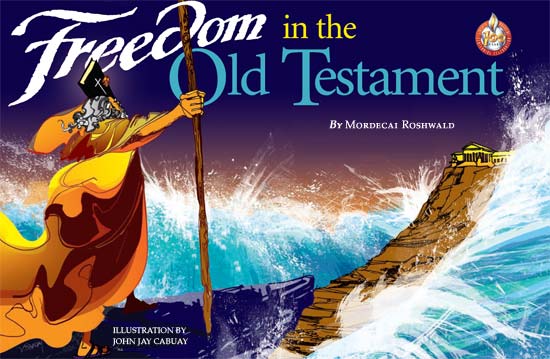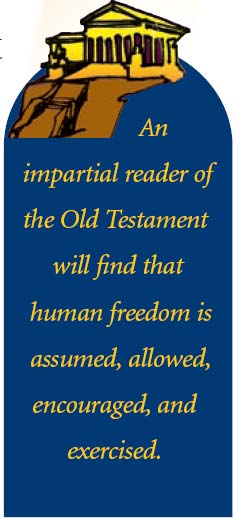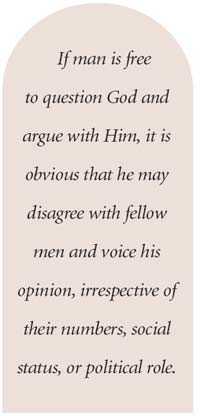Freedom in the Old Testament
Mordecai Roshwald March/April 2006
Getting your Trinity Audio player ready...

There is a widespread notion that the Bible, and especially the Old Testament, is and has historically been a force working against the freedom of man. This opinion is often stated not only by college students but also by distinguished scholars. They believe that the Greek heritage, with its philosophy, its poetry, its drama, its art, expresses the free-roaming human spirit, while the Old Testament represents a fervent religious belief that, by its very nature, is fanatical and intolerant of doubt, let alone dissent.
Ancient Greeks, though religious people on the whole, did not take their religion seriously, and their many gods quarreled among themselves, thus setting an example for diversity of opinion. Ancient Israelites, whose _religion dominated their life and civilization, had one jealous God who would not tolerate other deities—a belief expressing commitment to one all-embracing absolute and intolerant truth.
However plausible such arguments may sound, they are not borne out by facts. An impartial reader of the Old Testament will find that human freedom is assumed, allowed, encouraged, and exercised on the pages of the Old Book. Alas, few admirers of the Greek heritage read the Bible at all. Even fewer read the text without preconceptions. There is a point, therefore, in proving our case by quoting and exploring a few cardinal examples.
Freedom of Will
One instance of liberty, fundamental to the religious philosophy of the Old Testament, is the liberty of the collective will. The relationship between God and a people—the 12 tribes of Israel—is based on the conclusion of a covenant, not unlike a legal agreement between two parties. The terms of the agreement, originated and concluded in the wilderness of Sinai, are specified by God, who is one of the contracting parties: "Now therefore, if ye will obey my voice indeed,. . . then ye shall be a peculiar treasure unto me. . . a kingdom of priests, and an holy nation" (Exodus 19:5, 6). And the other party to the agreement, the people of Israel, answer: "All that the Lord hath spoken we will do" (verse 8). Significantly, this statement is not a mere pious uttering, but the collective decision and commitment of a nation, a decision duly conveyed by Moses, serving as an intermediary between the two parties, to God: "And Moses returned the words of the people unto the Lord" (verse 8). Obviously, an agreement is based on the free will of those who enter into it. The people of Israel, not unlike God Himself, have the free choice to enter into the agreement or not to do so: their decision, while binding, is made freely.

This assumption of free will can in no way be deemed as either self-evident or negligible. For there have been philosophies—and some are even fashionable today—that deny man this freedom of choice. It is quite acceptable to say that the wrongdoer is not really responsible for his action. It is his family circumstances, socioeconomic background, or the like that is the true cause of his behavior. In other words, it is not the free will of the individual but external factors that are responsible for his conduct.
Similarly, one could argue that the doer of good is not acting out his own will, but happens to act that way because his circumstances are beneficial. In both cases man is demoted from a free agent to a pawn of circumstances. The Old Testament asserts the humanity of man, the dignity of man, the sovereignty of man's will—whether he chooses good or evil. In a way this concept asserts the dignity even of the wrongdoer. For the Bible conceives man's actions not as an effect of causes, but as the outcome of conscious decisions. Here is human responsibility: Man cannot blame his circumstances; he is to blame. Free will and moral responsibility are interdependent, and the Old Testament insists on both.
Apart from philosophical resolution of the question of free will, it can be said that the notion of man's freedom and his responsibility for his actions, whenever and wherever it was adhered to, had had a beneficial influence both on man's self-awareness and on his conduct in society. A society of people believing in their responsibility, because they consider themselves free agents, is superior to a society of people who abdicate responsibility and see themselves as manipulated by circumstances, or ordered by other men.
Political Freedoms
The Old Testament's concept of free will shaped political as well as religious institutions. Democracy, as the direct rule of the people, may have been developed and instituted in ancient Greece; the freedom of the people to decide on the form of government to which they would submit, a fundamental democratic principle, is clearly expressed in the Bible.
The relevant passage can be found in 1 Samuel 8. There the people of Israel come to Samuel and demand establishment of a permanent monarchy, instead of a sporadic rule of judges. Samuel, as the spokesman for God, discourages them from taking such a step. Indeed, the biblical story suggests that the establishment of a human kingship is tantamount to the rejection of the direct rule of God. Says God to Samuel: "For they have not rejected thee, but they have rejected me, that I should not reign over them" (1 Samuel 8:7). Yet the divine displeasure does not ify the will of the people, and God, however reluctantly, accepts the people's decision and tells Samuel: "Hearken unto their voice, and make them a king" (verse 22). The freedom of the people to decide, even to make an erroneous decision, is firmly established.

The biblical notion of divine rule over men impelled individuals in ancient Israel to criticize society, to oppose governmental policies, to rebuke kings, in the name of God and morality. The history of prophecy, from Elijah to Jeremiah, abounds in examples of vigorous criticism of the mistakes and sins of kings and of the people. Political liberty involved the freedom and the right—indeed, the duty—of moralists to participate in social and political affairs through criticism and censure. And the voice of the prophets was not, by and large, a voice in the wilderness. It seems to have proved not less effective than the voice of any modern opposition party. It certainly has had a more lasting effect on humanity.
Freedom of the Mind
If the rule of God provided leverage for freedom of political and social criticism, the Bible also contains the testimony of man's freedom of mind and speech that is independent of God's authority, and even questions and criticizes God's ways with man.
A key story in this connection is the dialogue between Abraham and God with respect to the impending destruction of Sodom and Gomorrah, the sinful cities. Abraham, on being informed by God about His intent, does not accept the judgment passively, does not say, "Thy will be done," but, surprisingly, starts to question God. There may be in the city some righteous people, he argues, and poses the simple yet monumental question: "Wilt thou also destroy the righteous with the wicked?" (Genesis 18:23). Abraham, with great persistence, is trying to save the cities if there are some righteous people there, and through cautious yet persistent haggling brings down from 50 to 10 the number of the righteous for whose sake God would spare the cities. Though Abraham is fully aware that he is "but dust and ashes" (verse 27), he perseveres in his charitable attempt and drives home his point with great moral fervor: "That be far from thee to do after this manner, to slay the righteous with the wicked. . . . Shall not the Judge of all the earth do right?" (verse 25).
As we know, no 10 righteous were found in the sinful cities, and Lot and his family, the only righteous people there, escaped before destruction. God did not slay the righteous with the wicked. However, the significance of the dialogue is not affected by the sequel to the story. For the very fact that such a dialogue is included in the Bible—without being censured by the biblical editor—shows the profound respect it holds for freedom of opinion and liberty of speech. Man may question and even doubt the rightness of God's action. Man may be dust and ashes, but his condition does not deprive him of moral responsibility and judgment.
Nor is this story the only case of man's argument with God. On various occasions Moses argues with God, and so do some other prophets. The psalmist questions God's conduct of the world, especially why the righteous suffer and the wicked prosper (see Psalm 73). The book of Job reflects an even more profound criticism and skepticism. Ecclesiastes records views altogether dissenting from the mainstream of religious belief. The significant point about all this with respect to our theme is that freedom of mind and of speech is vigorously asserted in the Old Testament. Opinions sincerely held are given expression, even if they question God Himself and His conduct of the universe. This freedom of speech is not asserted as a doctrine; it is vindicated by example, by the actual inclusion of critical opinions and books in the compilation called the Bible.
If man is free to question God and argue with Him, it is obvious that he may disagree with fellow men and voice his opinion, irrespective of their numbers, social status, or political role. The conclusion is too obvious to require explicit elaboration—either in the Bible or in this essay. It must have served as another factor in the daring criticism of the prophets, who had the examples of Abraham and Moses in their respective arguments with God.
Contribution to Modern Liberalism
While the case of human liberty in the Bible can be substantiated by the biblical text itself and requires no outside authority and confirmation, it is important to mention that the point was understood by some prominent men of the past who influenced the modern tendency for freedom of expression. A prominent example in this respect is Milton.
John Milton, an English poet of the seventeenth century, versed both in Greek and in Hebrew, acknowledges the wide freedom of expression in the Bible and uses it as an argument for establishment of the universal principle of freedom. If censorship is allowed on the ground of the harm resulting from reading sinful and false matter, argues Milton, the Bible itself must become a prohibited book: "For . . . it brings in holiest men passionately murmuring against Providence through all the arguments of Epicurus" (John Milton, Areopagitica).
The Bible not only set an example for tolerance of opinions, but its very theology is based, as Milton recognizes, on the assumption of man's freedom of choice: "When God gave him [Adam] reason, He gave him freedom to choose, for reason is but choosing" (Areopagitica). Thus the dignity of man and the freedom of man in the Bible are recognized by Milton and reasserted by him.
Modern liberalism, whose spokesmen have not always resorted to the Hebrew sources, benefits from the erudition and insight of Milton, while all too often forgetting an important source of his inspiration.image 4 right original >
___________________________
Mordecai Roshwald was professor of humanities at the University of Minnesota. This article first appeared in the May/June 1976 issue of Liberty.